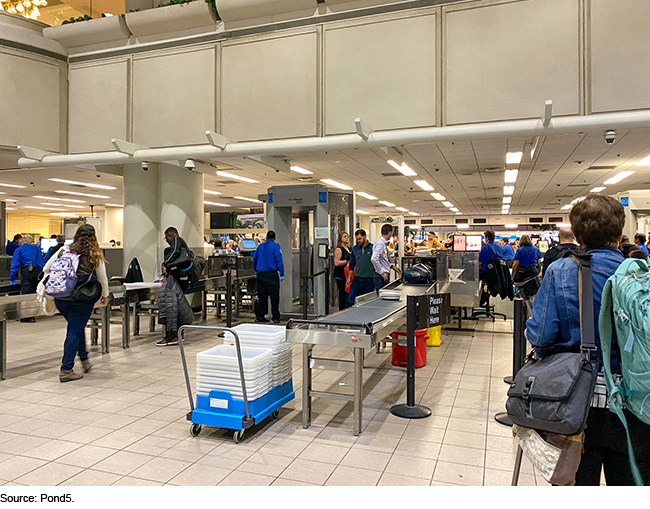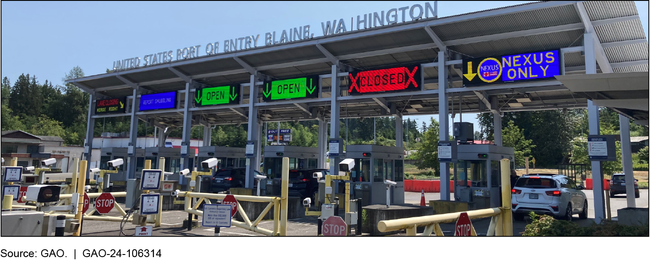Trusted Traveler Programs: DHS Has Enrollment Processes, but CBP Should Provide Additional Information on Reconsiderations
Fast Facts
Millions of travelers have enrolled in DHS trusted traveler programs—including Customs and Border Protection's Global Entry—which allow preapproved low-risk travelers to be quickly processed at airports or other ports of entry.
There are clear processes for enrolling in these programs and for reconsideration if membership is denied or revoked. But if CBP denies or revokes membership, it doesn't tell travelers how to seek more information about the specific reasons why. Before 2018, CBP included instructions for this in a notification letter, but inadvertently removed them when it updated the letter.
We recommended CBP address this issue.

Highlights
What GAO Found
The Transportation Security Administration (TSA) and U.S. Customs and Border Protection (CBP) operate five distinct trusted traveler programs—(1) TSA PreCheck® and CBP's (2) Global Entry, (3) NEXUS, (4) Secure Electronic Network for Travelers Rapid Inspection (SENTRI), and (5) Free and Secure Trade (FAST). These programs allow for expedited screening or inspection of preapproved, low-risk travelers at certain domestic and international airports and at select land and sea ports of entry. TSA and CBP have enrolled millions of travelers to these programs through a multi-step process that generally includes an online application, traveler vetting, and an enrollment eligibility decision. In fiscal year 2020 through the second quarter of fiscal year 2023, TSA enrolled or renewed TSA PreCheck® memberships for over 99 percent of applications, and CBP enrolled or renewed membership for over 97 percent of applications across its four programs.
NEXUS Lane at the U.S. Port of Entry in Blaine, Washington

TSA and CBP have reconsideration processes for travelers denied or revoked from a trusted traveler program. TSA informs travelers of its decision in a letter that includes steps for pursuing reconsideration—known as a “correction of record”—if travelers believe TSA based its decision on incorrect or incomplete information. CBP also informs travelers of its decision via a letter that includes steps for pursuing reconsideration. The CBP Ombudsman has sole discretion to sustain or overturn denial or revocation decisions, based on the totality of circumstances and any new information that the traveler has provided.
While CBP notifies travelers of denial and revocation decisions through letters posted to its online portal, it does not include instructions—required by regulation—for seeking additional information on the reason for its denial decision. According to CBP officials, the agency changed the format of its letters in 2018 when it updated its online portal and inadvertently removed these instructions. By providing these instructions, CBP could improve travelers' understanding of the specific reason for the decision, as appropriate, and could better ensure that travelers are able to directly address the reason for their denial or revocation when pursuing reconsideration.
Why GAO Did This Study
The summer of 2023 marked one of the busiest travel seasons on record. According to Department of Homeland Security's (DHS) data, each day approximately 2.5 million passengers boarded a commercial flight, and approximately 1.1 million travelers entered the U.S. through a port of entry during that period.
Congress included a provision in statute for GAO to review the DHS trusted traveler programs and reconsideration process. This report addresses (1) DHS's trusted traveler programs and enrollments and (2) the extent to which DHS provides reconsideration for travelers it denied or revoked from its programs.
GAO analyzed relevant regulations, policies, and program data from fiscal year 2020 through the second quarter of 2023; interviewed headquarters and field officials involved in the trusted traveler programs; and conducted in-person and virtual site visits to CBP enrollment centers that processed the highest volume of program applications in fiscal year 2022. While not generalizable, these visits provided program insights.
Recommendations
GAO recommends that the CBP Commissioner include written instructions in trusted traveler program denial and revocation decision letters on how travelers can seek additional information regarding the specific reason(s) for the decision. DHS concurred and identified steps to implement the recommendation.
Recommendations for Executive Action
| Agency Affected | Recommendation | Status |
|---|---|---|
| United States Customs and Border Protection | The CBP Commissioner should include written instructions in CBP's trusted traveler program denial and revocation decision letters on how travelers can seek additional information regarding the specific reason(s) for the decision. (Recommendation 1) | In June 2024, CBP updated its Trusted Traveler Program denial and revocation letters with instructions to travelers on seeking additional information about the specific reason(s) for the decision. Specifically, CBP's updated letters direct travelers to seek additional information on program denial or revocation decisions by contacting a Trusted Traveler Program enrollment center, submitting a question to the CBP Information Center, or submitting a Freedom of Information Act request. By providing instructions to travelers on how to seek more information within the letters, CBP can improve travelers' understanding of the specific reason for their denial or revocation and better ensure that... travelers are able to directly address the reason for their denial or revocation when pursuing reconsideration.
View More |
